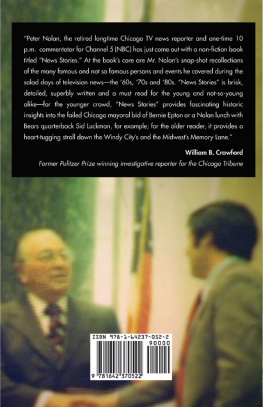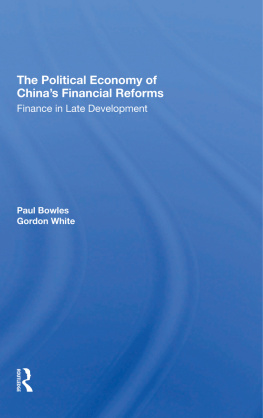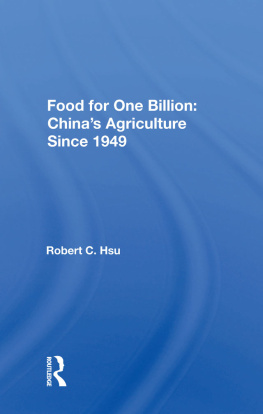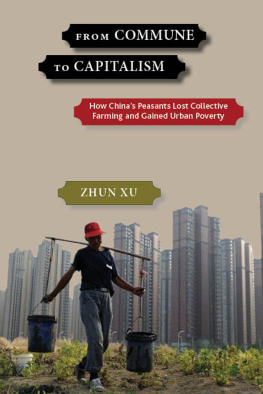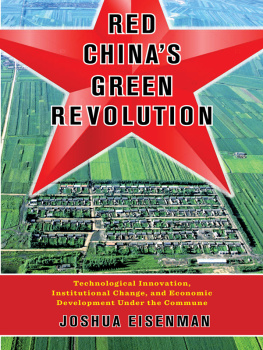The Political Economy of Collective Farms
Aspects of Political Economy
Series Editor: Geoffrey Harcourt
Published
A. Asimakopulos, Investment, Employment and Income Distribution
Pat Devine, Democracy and Economic Planning
Richard M. Goodwin and Lionello F. Punzo, The Dynamics of a Capitalist Economy
Marc Jarsulic, Effective Demand and Income Distribution
Peter Nolan, The Political Economy of Collective Farms
Bob Rowthorn and Naomi Wayne, Northern Ireland: The Political Economy of Conflict
Christopher Torr, Equilibrium, Expectations and Information
Warren Young, Interpreting Mr Keynes
Forthcoming
Paul Dunne (ed.), Quantitative Marxism
Grazia Ietto-Gillies, Causes and Effects of International Production
Ravi Kanbur, Risk Taking, Income Distribution and Poverty
Heinz Kurz, Capital, Distribution and Effective Demand
Jose Salazar, Pricing Policy and Economic Development
Ian Steedman, From Exploitation to Altruism
The Political Economy of Collective Farms
An Analysis of China's Post-Mao Rural Reforms
Peter Nolan
First published 1988 by Westview Press
Published 2019 by Routledge
52 Vanderbilt Avenue, New York, NY 10017
2 Park Square, Milton Park, Abingdon, Oxon OX14 4RN
Routledge is an imprint of the Taylor & Francis Group, an informa business
Copyright 1988 by Peter Nolan
All rights reserved. No part of this book may be reprinted or reproduced or utilised in any form or by any electronic, mechanical, or other means, now known or hereafter invented, including photocopying and recording, or in any information storage or retrieval system, without permission in writing from the publishers.
Notice:
Product or corporate names may be trademarks or registered trademarks, and are used only for identification and explanation without intent to infringe.
Library of Congress Cataloging-in-Publication Data
Nolan, Peter.
The political economy of collective farms: analysis of China's
post-Mao rural reforms / by Peter Nolan.
p. cm. (Aspects of political economy)
Bibliography: p.
ISBN 0-8133-0745-7
1. Collective farms China History 20th century. 2. Rural
development China History 20th century. I. Title. II. Series.
HD 1492.C5N65 1988
338.7'63'0951 dc19 88-15371
CIP
ISBN 13: 978-0-367-29488-5 (hbk)
Typeset in 10 on 12 pt Baskerville
by Setrite Typesetters Ltd., H.K.
For my mother, Barbara, and in memory of my father, Charles
Research for this book was assisted greatly by three trips to China. In the summer of 1979 I was a participant in the Queen Elizabeth House (Oxford) China Study Group which spent three weeks in different parts of the countryside. I am grateful to Neville Maxwell and Keith Griffin for their roles in organizing this trip and the Chinese Academy of Social Sciences, Institute of Agricultural Economics, and, especially, to Wang Gengjin, Deputy Head of the Institute, for arranging our research in China. At that time 'de-collectivization' of agriculture was in its early phase of 'contracting output to the group' ( bao chan dao zu ). In the summer of 1983 I spent two months in Sichuan province looking at close quarters at the countryside in that part of China which had most rapidly completed the transition to 'contracting work to the household' ( bao gan dao hu ), the most dramatic stage of China's 'de-collectivization'. I would like to thank the British Academy for financing this trip and the Sichuan Chinese Academy of Social Sciences for arranging my stay in Sichuan. In 1986 I spent three weeks at the Economics Research Institute of the Chinese Academy of Social Sciences in Peking, collecting materials on, and discussing, China's rural reforms. I wish to thank the British Academy for financing this trip also, and the Economics Research Institute for its kind hospitality. I would like to thank, especially, Dong Fureng, Head of the Economics Research Institute, for his invitation to work there. Shang Lie, also of the Economics Research Institute, was of immense help in my research. My research has been assisted also by financial support from Jesus College, Cambridge, and the Department of Applied Economics, Cambridge.
The motive to write this book stemmed mainly from the discussions I have had at a large number of seminars on this topic over the years. The following people have all helped shape my views and I, accordingly (with the usual caveat ), thank them: Bob Ash, John Barber, Melanie Beresford, Krishna Bharadwaj, Francesca Bray, Lisa Croll, John Dunn, Michael Ellman, Adam Fforde, Ajit Ghose, Paul Ginsborg, Jack Gray, Keith Griffin, Chris Hann, Caroline Humphrey, Y.Y. Kueh, James Kung, Liu Minquan, Bruce MacFarfane, Neville Maxwell, Louis Putterman, Bob Rowthorn, Ashwani Saith, John Sender, Ajit Singh, Janice Stargardt, Sadie Ward, Gordon White and John Wells. I owe a special debt to the late Suzy Paine, with whom the issues in this book were argued about on innumerable occasions. I wish also to thank members of the Cambridge Research Group on the Chinese Economy, including Chris Bramall, Li Feifei, Sheng Yuming, Wing Shing Tang, Wang Hong, the late Wang Lin, Zhang Xunhai and Zhu Zhongdi. Wang Hong, Wang Lin and Zhang Xunhai provided me with a great deal of information and gave me numerous insights into the workings of the Chinese rural economy. Both Chris Bramall and Andrew Watson were kind enough to read the entire first draft of this book with immense care and I am much indebted to them for their extensive criticisms. The comments of Geoff Harcourt, the general editor of this series, were of great help. John Thompson of Polity Press was an invaluable source of enthusiasm and expert assistance from start to finish of the project. I wish also to thank both Terry Byres and Charles Curwen for their support of my work over many years. Jenny Woodhouse undertook the laborious task of typing successive drafts of the manuscript and provided a constant source of critical feedback on the contents.
Most especially, I wish to thank my wife Siobain Mulligan and our son Dermot for their consideration and support during the preparation of this book.
This book examines the case for and against collective farms in developing countries' economic strategies in the light of China's post-Mao rural economic reforms. It concludes that collective farms are not, usually, a useful institutional form for poor countries. I did not always hold this position,
The main arguments of this book are simple and seem to me to be common sense. I feel impelled to write it, nevertheless, because in giving talks over the past few years in a wide variety of places (to academics and non-academics), I have encountered much hostility to my views. Commitment to collective farms, in whatever guise, as a suitable institutional form for poor countries' rural areas still runs surprisingly deep among a wide assortment of groups in the West. It is powerful also in some important intellectual circles in the Third World. This is the case, for example, among a large number of left-wing Indian economists. They believe that collective farms offer a desirable alternative to the Indian structure of rural organization, and, consequently, there is a deep desire to believe that the Chinese rural economy under Mao performed well.


